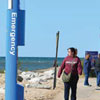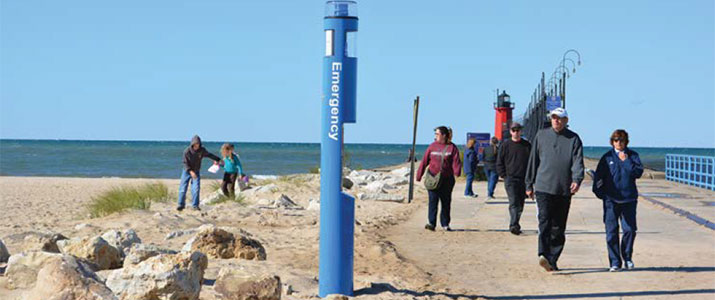
A Swell of Security
Michigan community protects beachgoers and harbor
- By Michael Zuidema
- Dec 25, 2013
 Located along the southeastern shoreline of Lake Michigan, the city
of South Haven annually sees its population swell as thousands
flock to its beautiful harbor and beaches. Each summer, South Haven’s
5,000 year-round residents are joined by an estimated 15,000
boaters, swimmers, tourists and retirees returning north—all eager
to enjoy the city’s seven lakefront beaches, four public marinas and mouth of the
4.2-mile Black River.
Located along the southeastern shoreline of Lake Michigan, the city
of South Haven annually sees its population swell as thousands
flock to its beautiful harbor and beaches. Each summer, South Haven’s
5,000 year-round residents are joined by an estimated 15,000
boaters, swimmers, tourists and retirees returning north—all eager
to enjoy the city’s seven lakefront beaches, four public marinas and mouth of the
4.2-mile Black River.
In the summer of 2009, however, that picturesque setting was shaken when
45-year-old Martin Jordan from St. Charles, Ill. drowned while saving his two children
from strong rip currents in Lake Michigan.
An ensuing federal lawsuit alleged that the city of South Haven should have
had more safety measures in place to warn beachgoers of dangerous water conditions.
As part of the settlement, South Haven officials agreed to enact a variety
of new beach and pier safety efforts, including the installation of emergency help
points at the city’s North and South beaches.
Enter Code Blue Corp.
The Holland, Michigan-based manufacturer of emergency communication solutions
was tabbed by the city to install a pair of blue light pedestals, equipped with
emergency speakerphones operated by a high-tech software system.
With the help of MidState Security of Wyoming, Mich., city officials selected
the model CB 1-d, a 9-foot-tall pedestal help point from Code Blue for its rugged durability, multifaceted features
and high visibility. The unit has two
openings: one equipped with Code
Blue’s IP5000, a self-monitoring, VoIP,
emergency speakerphone, and the other
used for directory listings, although it
also could have been used for card readers,
CCTV and other security devices.
Managing the entire system is Code
Blue’s ToolVox unit programming and
diagnostics (UPD) that provides an efficient,
easy-to-use template for the administration
of emergency units.
“The intent of the call boxes is to
provide our beachgoers with safe and
efficient contact to the city’s first responders,”
said Brian Dissette, South
Haven city manager. “It is our expectation
that having the call boxes onsite will
make the process of seeking help easier
for out-of-town beachgoers, as they will
not have to rely on landmarks to guide
first responders to their location.
“Further, during special events in
South Haven, we routinely will lose
mobile phone service due to the volume
of users accessing the mobile phone
networks. Having the call boxes onsite,
we anticipate the public will always be
able to reach first responders.”
The entire package ensures that visitors
will never be far from immediate
assistance, whether it’s an emergency
in the water or something a little more
mundane, like car trouble or someone
asking for directions.
“Efficient communication between
the public and first responders is the
biggest benefit,” Dissette said. “The
call boxes are also equipped with contact
to the city’s non-emergency phone
system, which allows the public to
contact the city’s staff to address questions
about the city, special events or
beach parking rules.”
The safety improvements have been
met with approval by the community.
“Very positive…anything we can do
to improve the safety of the beachgoers
is generally well-received,” Dissette
said. “The city’s elected officials were
of unanimous consent when they approved
the purchase, and they’re looking
forward to seeing these upgrades
available for future beach seasons.”
A Rich History
South Haven officials have long known
about Code Blue. In addition to being
located only about 30 miles south of
Code Blue’s corporate headquarters, a
portion of the company’s machine work
is occasionally done in South Haven.
“Code Blue has a strong presence
throughout the state of Michigan and
can be seen at public facilities across
the state,” Dissette said. “The company
is a ‘known quantity’ and was readily
familiar for South Haven officials. The
company has supplied equipment to
other lakeshore communities and has
done a good job of servicing those applications.
As a result, South Haven felt
confident we were getting a high-quality
product that is locally made.”
Code Blue products have been
used to improve safety and security at
beaches in Santa Monica, Calif. and all
around the Great Lakes region. In addition,
they can be found at the Golden
Gate Bridge in San Francisco and the
Port of Seattle.
“We were more than happy to assist
South Haven with its safety upgrades,”
said David Cook, Code Blue COO.
“We have a wide range of products that
are ideal for cities with waterfront locations.
Whether it’s help points, mass
notification software or public address
speakers, Code Blue works hard to ensure
that safety and security is a top
priority for any project.”
Connecting to Life
MidState Security combined the Code
Blue pedestals with Ultra 8-megapixel
video cameras to communicate over
wireless broadband connectivity, and
further improve safety and security on
the waterfront.
“This solution connects to life-safety
personnel, allowing for the visual monitoring
of any emergency,” said Lewis
Stallworth, strategic account manager
for MidState Security. “Authorities
are able to pass along real-time assessments
to first responders, before they
reach the scene, maximizing preparedness
and saving precious time.
“As an added benefit, the solution
allows for the observation of weather
conditions and beach traffic. This will
assist in more efficiently directing first
responders to the location of an emergency
situation.”
The city also invested $20 million
in a new water filtration plant located
across the street from South Beach,
and $3 million to renovate Phoenix
Street, which leads through downtown
to the waterfront, in addition to new
parking lots, playground equipment
and walking paths.
“We also opted to have cameras installed
so that we can view the actual
wave conditions on a real-time basis.
We’ve installed beach warning flags
that are maintained throughout the
day, every day, throughout the swimming
seasons,” Dissette said. “In addition
to those upgrades, on the piers we
have ‘throw’ rings, as well as ropes and
other equipment to help with actual rescue
efforts. We find that those are used
throughout the summer routinely.”
When combined with Code Blue’s
help points, the added safety measures
guarantee that beachgoers have even
faster and more efficient communication.
Dissette said that the city is planning
to purchase additional units to place in
other locations along the water to improve
safety even more in the future.
“What we’ve found is taking some of
the guesswork out of the response for
police and fire makes a lot of sense,” he
said. “By having a push button, it eliminates
the question of where we need to respond,
so we’re hopeful having Code Blue
on the beach will make it simpler for first
responders to get to the
exact location where
help is needed.”
This article originally appeared in the January 2014 issue of Security Today.